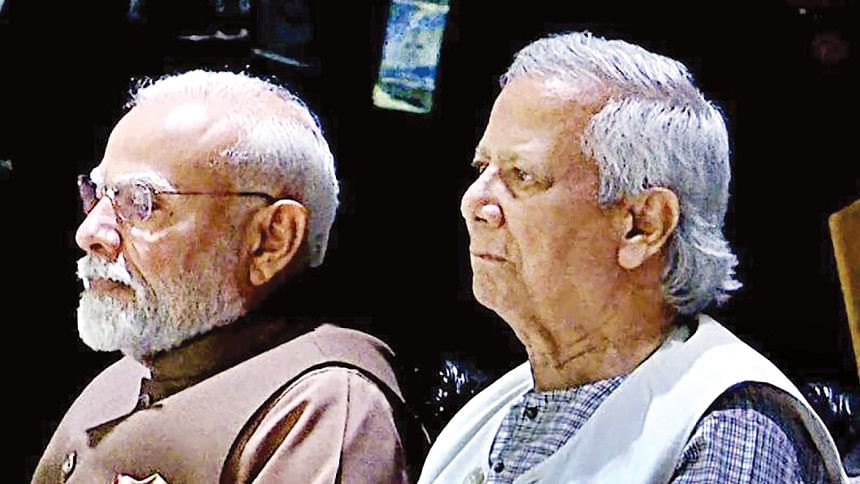Yunus-Modi meet: Restoring mutual trust key objective

Restoring confidence in Dhaka-Delhi ties will be the key objective of the meeting between Chief Adviser Prof Muhammad Yunus and Indian Prime Minister Narendra Modi in Bangkok today, diplomatic sources said.
According to an official involved in the chief adviser's visit to Thailand, the meeting is set to begin at 12:15pm local time and will last for approximately 20 to 25 minutes following the BIMSTEC summit.
When asked about the agenda, the official said that while all aspects of the bilateral relationship would be discussed, the primary focus would be on rebuilding trust and strengthening mutual confidence.
It will be the first one-on-one meeting between the two leaders since the political changeover in Bangladesh last year.
They met each other, along with other BIMSTEC leaders, at a dinner hosted by Thailand Prime Minister Paetongtarn Shinawatra last evening.
Foreign Adviser Touhid Hossain met Indian External Affairs Minister S Jaishankar twice -- once in New York in September last year and in February in Oman this year. But bilateral relations have remained strained.
India has repeatedly expressed concerns over alleged attacks on religious minorities in Bangladesh, which the Bangladeshi government has termed interference in its internal affairs.
Bangladesh has witnessed growing anti-India sentiment for different reasons, including New Delhi's alleged support to Sheikh Hasina during her 15-year rule. She fled to Delhi after losing power on August 5 last year.
New Delhi has not responded to Dhaka's request to extradite the former prime minister to face trial for killings committed during the mass uprising.
Meanwhile, the Indian High Commission in Dhaka has substantially reduced the number of visas for Bangladeshis, citing a staff shortage.
Against this backdrop, the meeting between Prof Yunus and Prime Minister Modi could serve as a confidence-building measure, even amid lingering concerns between the two nations on various issues, diplomatic sources said.
"We want to have a good relationship with India, a good working relationship," Adviser Touhid told the media recently.
Foreign ministry officials emphasised the deep interdependence between Bangladesh and India, warning that strained relations hinder progress on both bilateral and regional fronts.
According to diplomatic sources, the Bangladesh side would touch upon at least nine points, starting with Bangladesh's appreciation of historical ties with India and recent diplomatic courtesies, and acknowledge India's role as a trusted neighbour and development partner.
The sources said the chief adviser would reaffirm the interim government's commitment to a smooth democratic transition, stability, and regional peace, while stressing the importance of policy continuity in existing bilateral commitments, particularly in security, trade, and connectivity.
They said Bangladesh would express readiness to engage in deeper political and economic cooperation and propose convening the Joint Consultative Commission (JCC), a foreign secretary-level dialogue, soon.
"We would propose relaxing visa requirements for students, patients, and business communities, especially to introduce more flexible and expedited visa processing for medical, educational, and business purposes," one of the sources said.
Bangladesh may also request removal of Non-Tariff Barriers and enhanced market access for Bangladeshi exports, propose accelerating progress on BBIN (Bangladesh Bhutan, India Nepal) motor vehicle agreement, BIMSTEC transport corridors, and energy grid connectivity.
Dhaka would also highlight the importance of train connectivity for trade, tourism, and people-to-people ties, while proposing the resumption of Bangladesh-India cross-border train operations, which have remained suspended.
It would stress improved cooperation on border security, with the emphasis on avoiding civilian casualties.
Sources said Dhaka would suggest enhancing joint patrols and information sharing to prevent untoward incidents.
Bangladesh will also urge India's active diplomatic role in facilitating the safe, dignified, and voluntary repatriation of Rohingyas to Myanmar, a diplomatic official said. It would mention the challenges Bangladesh has been facing in sheltering 1.2 million refugees. Dhaka would also highlight the regional security challenges the refugee crisis poses.
The official said Prof Yunus would reaffirm Bangladesh's commitment to strengthening BIMSTEC cooperation, suggest joint projects in disaster management, climate change adaptation, and energy security, and express optimism about opening a new chapter of trust and collaboration.
He may also formally invite Modi to visit Bangladesh.
An Indian diplomat from New Delhi said India was eager to advance mutual interests and priorities, but it is crucial for India that Bangladesh pays due attention to their security and strategic concerns in the region.
"We will continue to work with Bangladesh on this," he told The Daily Star.
The diplomat emphasised that beyond trade and economic ties, stability in Bangladesh is crucial for regional security. Therefore, fostering a constructive and cooperative relationship with Bangladesh is essential for safeguarding India's borders.


 For all latest news, follow The Daily Star's Google News channel.
For all latest news, follow The Daily Star's Google News channel. 



Comments